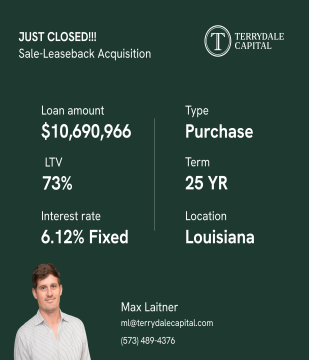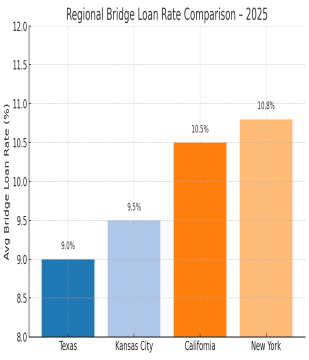All You Need to Know About Mezzanine Debt and Preferred Equity

Terrydale Capital
Jun 4, 2024 12 Min read
Capital and funding for enterprises and investments has become more diverse, with more alternatives, features, and approaches available.
Knowing how these various types of finance work will help you as an investor better understand what you're getting into, the best kind of debt or private equity investment to make according to your needs, and applying an intelligent capital stack to reduce risk and maximize profits.
Here is all you need to know about Preferred equity and mezzanine loans for real estate, how they're structured, and how private equity real estate sponsors use both types of investments to generate profits.
Why Preferred Equity or Mezzanine Debt?
Lenders are showing more reservation in the market and inflated asset pricing in capital markets. This requires more cash to close from our investors, which can be achieved using second position options similar to Mezzanine and Preferred Equity.
Preferred Equity
Preferred equity is similar to mezzanine finance in many aspects. Both are types of junior debt that are used to complement senior debt. While mezzanine finance uses the property as collateral for the loan, the lender receives an equity share in the property, whereas preferred equity is an investment in the firm.
Preferred equity offers the investor a higher rate of return than ordinary equity, and the investor has the option of paying off the debt sooner.
Preferred Equity's Characteristics
The following are some of the characteristics of preferred equity investment:
| Borrowers can deduct interest from their taxes. |
| Some interest may be delayed if the borrower cannot make a scheduled payment. |
| If the borrower defaults, lenders will obtain shares in the company. |
| Lenders may obtain warrants in exchange for an ownership position in the company, and interest payments are made monthly, quarterly, or annually. |
When Does Preferred Equity Come into Play?
Due to the seniority in collecting payments from the project, preferred equity can be a safer method to participate in a private equity real estate deal for a passive real estate investor than common equity.
Investor Advantages in Preferred Equity
| Increased dividends. In general, preferred shares pay higher regular dividends than common stock. Because you're taking on more risk, the payouts are usually higher than you'd get from a bond. |
| Priority access to assets is provided. Preferred shareholders have priority over common stockholders in the event of a bankruptcy, but they are still behind bondholders. |
| Callable shares may provide a premium. The corporation can purchase back preferred shares since it is callable. You may receive more than you paid for the preferred stock if the callable price is higher than the par value. |
| Convertibility of preferred shares to common stock. You can exchange your preferred stock for common stock when you buy convertible shares. |
What is Mezzanine Debt?
Traditional financial institution finance is commonly used as the primary funding source for commercial real estate. Because the financial institution is the initial mortgage holder, this loan is at the bottom of the capital stack. Most borrowers aim for a loan-to-value ratio of 75% or higher, but not everyone can achieve this level of leverage for various reasons. Mezzanine debt can help in this situation.
A financial institution or private money loan with junior to senior debt financing is known as mezzanine debt. It is positioned behind all other recorded debt but ahead of all equity positions in the capital stack. Mezzanine debt has rates that are often two or three times higher than traditional financial institution loans. It has no principal amortization and does not participate in back-end profit sharing; it is solely a risk-adjusted yield play for stockholders.
Characteristics of Mezzanine Debt
A mezzanine debt investment has the following characteristics:
| It is subordinated to senior debt, with preferred and common equity taking precedence. |
| Senior debt has a higher interest rate, but preferred equity has a lower rate of return. |
| In most cases, it is not secured by real estate. |
| A mezzanine debt loan can have a shorter term than a senior secured debt loan. |
| Interest-only payments can be made rather than repayments that are amortized over the loan's length. |
What is the Structure of Mezzanine Debt?
In a private equity real estate project, mezzanine debt can benefit stockholders by generating higher risk-adjusted returns and providing the sponsor with additional financing options.
The Advantages of Mezzanine Debt for Investor
| Mezzanine investors benefit from equity investing, such as high returns and a broad portfolio. If the borrowing firm succeeds, the mezzanine investor can take advantage of the stock option and reap the benefits. Furthermore, the mezzanine investor receives the interest payment even in the worst-case scenario. The interest rate for mezzanine financing is higher than regular borrowing. |
| Warrants or convertible equity options, which a mezzanine investor can exercise to obtain a stake in the firm, are frequently included in mezzanine financing. As specified in the agreement, the rights can be exercised on a set day or upon the occurrence of a specific event. |
Cons of Preferred Equity and Mezzanine Debt
- Higher legal costs due to additional analysis and loan documents
- Could pose unique scenario questions from investors, must be knowledgeable
- Shorter term agreements could pose higher cost
Effects of Foreclosure
Depending on the investor's position in the capital stack, the repercussions of foreclosure differ. In the event of a sponsor's failure, both preferred equity investors and mezzanine loan holders may be able to take control of the project.
Preferred Equity
Preferred equity does not have the option of foreclosing on the real estate if a sponsor defaults. This tool is only available to senior loan providers who have secured a mortgage using the property as collateral.
Mezzanine Debt
In the case of a foreclosure, the mezzanine lender will be required to sell the parent company's securities under the UCC Article 9 foreclosure process. As a result, mezzanine lenders benefit from a shortened legal process that can assist in the removal of a defaulting sponsor. Foreclosure on an LLC's securities can usually be completed in 45 to 60 days via the UCC method. The mezzanine lender will possess 100 percent of the LLC that owns the property when the foreclosure is completed, thus removing the sponsor from the structure.
Which is the Best Option for You?
There are numerous advantages to using mezzanine finance or preferred equity. Anyone struggling to obtain equity will likely be interested in mezzanine loans, which allow the sponsor to bridge the gap between the senior lender and common equity. Sophisticated borrowers are usually wary of becoming over-leveraged. The chance of foreclosure rises as the debt grows.
Terrydale Capital: Providing Specialized Financing Options for Commercial Investment Properties
Terrydale Capital is a leading commercial real estate financing firm in Dallas, Texas, with offices in Kansas City, MO. We are dedicated to bringing you accurate and up-to-date capital market knowledge through valid Lender and Broker relationships, cutting-edge technology, and unrivaled industry experience.
We take pride in close relationships with top banks, lenders, and family offices, allowing us to offer the most attractive financing solutions in the market.
At Terrydale, we are committed to excellent customer service through timely and constant communication, superior solutions, and step-by-step guidance throughout the process to guarantee you success.
Our range of superior services includes Loan Programs, Advisory and Consultation, Capital Finance, and everything in between. For more information on Preferred Equity or Mezzanine or queries on how we can help, feel free to Contact Us today, and we will be more than willing to assist.
Partner With Terrydale Capital for Your Debt Financing Needs
When it comes to debt financing, understanding the right timing, process, and options is crucial. At Terrydale Capital, we provide a comprehensive range of commercial loan solutions tailored to meet your business's unique needs.
































































































































































































































































































































































